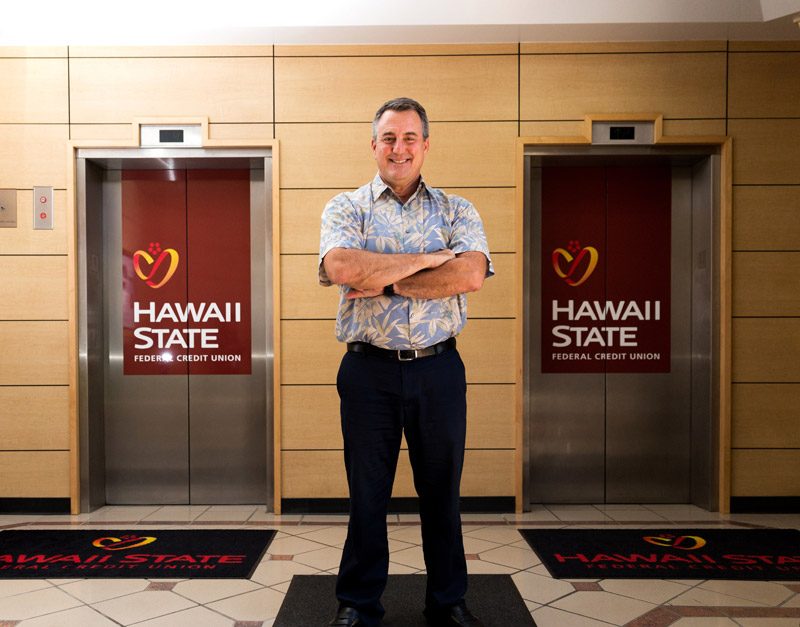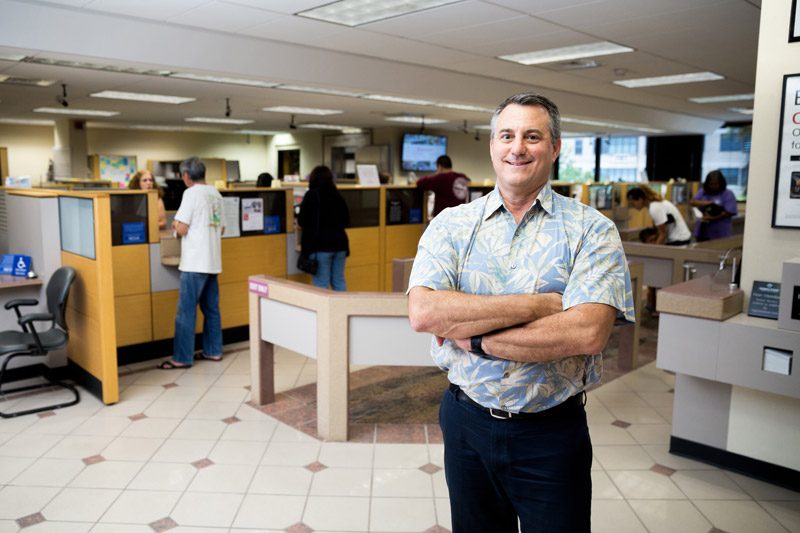Credit And Credibility

Hawai‘i State FCU president-CEO Andrew Rosen
Hawai‘i State Federal Credit Union celebrates its 80th anniversary, a milestone that president-CEO Andrew Rosen credits to its 300 employees and 98,000 members.
Hawai‘i State Federal Credit Union celebrates its 80th anniversary this year and for president-CEO Andrew Rosen it’s a thriller. Not that it’s anything like the Michael Jackson horror routine. But surprise moves at every turn resemble the dance of change credit unions are going through these days.
If anyone can make the right moves to sustain the business, it’s Rosen.
Credit unions have become a formidable force in financial services, making traditional banks whirl in competition. Survival calls for strategic gyrations. It’s like moonwalking in consumerism — one can easily slide backwards while posed for forward momentum.
Yet if you look at the history of Hawai‘i State FCU, one sees the purposeful path it has taken to be relevant and responsive to members. Any institution that has waltzed through 80 years of Hawai‘i’s cost of living challenges and economic swings deserves a closer look.

President-CEO Andrew Rosen at Hawai‘i State FCU’s main branch on Halekauwila Street.
Tanomoshi Tradition
Rosen is quick to give credit, “We didn’t write our history, our members did. Every step and milestone happened because of them.”
As Grant Tanimoto, Hawai‘i State FCU board chairman, puts it, “Hawai‘i has a strong history of supporting the credit union cooperative model which has roots in the old plantation-days concept of ‘tanomoshi’ — the idea of people pooling their money to help each other fund financial necessities.”
The people helping people philosophy continues to ring true today.
The member orientation is a key difference between credit unions and banks. Since both offer similar services, the terms often get confused. So let’s clear that up.
A credit union is a not-for-profit financial cooperative owned and operated by its members. A bank is a profit entity of shareholders that is licensed to receive deposits and make loans.
In the case of Hawai‘i State FCU, members are drawn from active and retired state and city employees and their immediate families.
The organization was formed in 1936 by government workers and known as Territorial Employees Credit Union. It later became Hawai‘i State Employees Federal Credit Union.
Its first-ever branch office is in downtown Honolulu at Ali‘i Place, on the corner of Hotel and Alakea streets. The name was changed to Hawai‘i State FCU in 1996.
Today, Hawai‘i State FCU has nine branches — eight on O‘ahu and one on Maui — with 300 employees serving 98,000 members. It is the largest credit union lender in the state.
“With more than $725 million in loans to members, we have expanded our lending to include mortgages, solar and small business loans,” says Rosen.
“It’s our vision to build relationships that empower a lifetime of personal and financial well-being,” he adds. “The reality is that nearly half of Hawai‘i residents are living paycheck to paycheck. We understand the financial issues of our community and feel responsible to serve with resources and education to overcome financial challenges.”
Serving an island community with diversity and other uniqueness sets apart Hawai‘i’s credit union from nationwide counterparts. Add to that the realities of today’s technology and consumer fickleness, and the administrative task is immense.
Regulatory Reggae
We ask Rosen what keeps him up at night. While most of us count sheep to sleep, does he count depositors?
He laughs, “Reading pages of regulatory rules usually do it for me. Some are a thousand pages.”
Indeed, the impact of excessive regulation cannot be overstated, industry observers say. It slows economic growth, hampers innovation, stymies job growth and pushes compliance costs to astronomical levels, according to the National Association of Federally Insured Credit Unions.
But it’s a given in the financial services field, where consumer protection and safeguards for banking are paramount.
Rosen knows this well, having more than 22 years of experience in financial services. He has held leadership positions at several large institutions in Hawai‘i and the Mainland, including Bank of the West, Washington Mutual, Regions Financial Corp, Bank of Hawai‘i and Central Pacific Bank.
Following a noteworthy marketing turnaround at Bank of the West, he was named Hawai‘i State FCU’s president and chief executive officer in April 2012.
The Boston native holds a masters in public policy from Harvard University’s John F. Kennedy School of Government in Cambridge and an undergraduate degree from the University of California at Berkeley.
Married with three sons ages 20, 18 and 16, he met his wife Maia, an educator and librarian, at graduate school.
Credit Choreography
Asked to give an overview of credit unions today, Rosen provides interesting insights.
“Hawai‘i used to have 140 credit unions; now there are 60,” he says. “Closures and consolidation from financial crises, crippling regulations and marketing realities changed the landscape.
“Yet Hawai‘i is different from Mainland markets because nearly 60 percent of people here have credit union accounts,” he adds. “When loans are up and profits down, we hail that as success. We are giving back to our members and investing in creating greater value.
“Credit unions are very collaborative in Hawai‘i,” states Rosen, a Hawai‘i Credit Union League board member. “We support each other.
“Loyalty in any business requires constant nurturing,” the 54-year-old executive observes. “The consumer has the ultimate power to choose among the financial products and rates presented to them in the marketplace.
“Some of it is inertia — it’s a hassle to change banks and move money — but with new technology, it’s easier to switch.
“Institutions can be their own worst competitor if they don’t meet members’ expectations and needs. We have to earn loyalty every day,” he says.
Referral is a great source of new members, he claims. It’s an indicator of how well Hawai‘i State FCU is regarded in the community.
Collectively, credit unions everywhere are enjoying remarkable membership and loan growth.
According to industry experts, credit unions have added 13 million new members in the last five years.
In 2011, after the financial crisis, about 600,000 Americans switched from big banks to credit unions or community banks. Some doubted that the credit union growth would last — but they were wrong.
Monster Mash
Credit unions hit a major milestone in 2015. For the first time in history, credit union member savings in the U.S broke $1 trillion. Consumers were drawn to the fact that credit unions boost the local economy, and are locally owned and run. Also cited by trade observers are lower fees, better returns, free checking accounts, the not-for-profit model and the advantages of being a member and therefore an owner of a cooperative.
All of this portents sustained growth and liquidity for credit unions, including Rosen’s organization.
“We’re hoping to open a new branch a year,” he reveals. “We’re looking carefully at communities where our members are concentrated. West and Windward O‘ahu look promising.”
Hawai‘i’s latest branch is in Hawai‘i Kai Towne Center, where a technology center and private offices for member consultations are featured. In addition, the Pearlridge branch sports a new look from a major renovation.
“We continue to support the local community through partnerships with Friends of the Library and many other nonprofits,” Rosen beams. Pop-up book stores at the main branch at 560 Halekauwila Street and Ali‘i Place downtown branch are refreshed with bargain books throughout the year.
That high touch with locals is an important facet of the credit union’s face to the community.
Rosen’s rebranding, including a new heart-shaped logo, that refreshed Hawai‘i State FCU’s public image supports its promise to be “always right by you.”
It is a reminder that core competencies of businesses must be carefully aligned with cultural and emotional values of a community. Where one puts their hard-earned money and financial trust taps into serious deliberation.
As the new generation of depositors and loan applicants search the universe on its smartphone to choose financial institutions and payment systems, the ability to meet their needs will only grow more challenging and demanding.
Rosen and his team seem up to the task. Backed by awards and accolades, including Hawai‘i’s Best Place to Work designation, there is credibility in an 80-year track record.
His dance card is full, but Rosen’s ready to step out.
Want to watch Hawai‘i State FCU’s “Thriller” video with Rosen as lead dancer? Check it out at youtube.com/watch?v=0HjvPtJp1gA.






